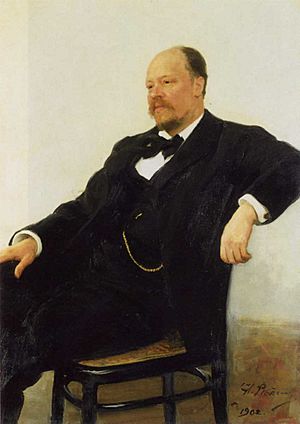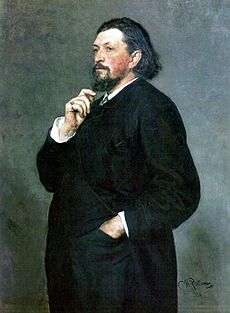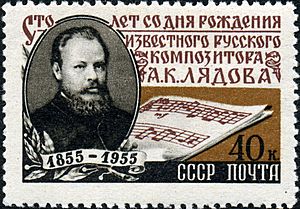Anatoly Lyadov facts for kids
Quick facts for kids
Anatoly Lyadov
|
|
|---|---|
 |
|
| Born | 12 May 1855 |
| Died | 28 August 1914 (aged 59) Borovichevsky, Novgorod Governorate, Russian Empire
|
| Occupation |
|
Anatoly Konstantinovich Lyadov (Russian: Анато́лий Константи́нович Ля́дов; 12 May [O.S. 30 April] 1855 – 28 August [O.S. 15 August] 1914) was a talented Russian composer, teacher, and conductor. He came from a very musical family in Saint Petersburg, Russia. Lyadov is best known for his short, colorful orchestral pieces inspired by Russian fairy tales.
Contents
About Anatoly Lyadov
Lyadov was born in 1855 in Saint Petersburg, Russia. His family was full of famous musicians. His stepfather, Konstantin Lyadov, who was a conductor, taught him music from a young age.
In 1870, Anatoly joined the St. Petersburg Conservatory. He first studied piano and violin. But he soon decided to focus on counterpoint (combining melodies) and fugue (a type of musical chase). He was still a very good pianist.
Many people, including the famous composer Modest Mussorgsky, recognized his amazing musical talent. In the 1870s, he joined a group of composers known as The Five. He also studied composition with Nikolai Rimsky-Korsakov. However, he was briefly expelled from the conservatory in 1876 for missing too many classes! He was allowed back in 1878 to finish his studies.
A Family of Musicians
Anatoly Lyadov grew up surrounded by music.
- His father, Konstantin Lyadov, was the main conductor for the Imperial Opera Company.
- His mother, V Antipova, was a pianist.
- His uncle, Alexander Lyadov, conducted the orchestra for the Imperial Ballroom.
- His cousin, Vera Lyadova-Ivanova, was a well-known actress and singer.
Lyadov as a Teacher
Lyadov started teaching at the St. Petersburg Conservatory in 1878. He taught many students who later became famous composers themselves. Some of his notable students included Sergei Prokofiev and Igor Stravinsky. See: List of music students by teacher: K to M#Anatoly Lyadov.
He was known for being a very precise teacher. Conductor Nikolai Malko, who studied with Lyadov, said that his advice was always clear and helpful. Lyadov could be a bit lazy, though. He might stop talking in the middle of a sentence to trim his fingernails!
Igor Stravinsky remembered that Lyadov was strict with himself and his students. He always paid close attention to details in music. Sergei Prokofiev recalled that Lyadov didn't like new, modern musical ideas. He would sometimes jokingly tell Prokofiev to go study with other composers like Richard Strauss or Debussy. But Lyadov still told his friends that he had to teach Prokofiev because he needed to develop his musical style.
In 1905, Lyadov briefly quit his teaching job when his old teacher, Rimsky-Korsakov, was fired. He returned when Rimsky-Korsakov was hired back.
Friends and Supporters

Lyadov played a role in connecting a wealthy timber businessman and philanthropist (someone who gives money to good causes) named Mitrofan Belyayev with the young composer Alexander Glazunov. Belyayev became very interested in Glazunov's music. Soon, he started supporting a whole group of Russian composers.
In 1884, Belyayev began organizing Russian Symphony Concerts. He also created an annual music award. The next year, he opened his own music publishing company in Germany. He published music by Glazunov, Lyadov, Rimsky-Korsakov, and Borodin. Young composers often asked Belyayev for help. Belyayev asked Lyadov, Glazunov, and Rimsky-Korsakov to form a group to choose which young composers to support. This group became known as the Belyayev Circle.
In 1887, Lyadov met the famous composer Pyotr Ilyich Tchaikovsky. Tchaikovsky had not liked one of Lyadov's earlier piano pieces. But after meeting Lyadov, Tchaikovsky's opinion changed. He even sent Lyadov a copy of his Manfred Symphony. Tchaikovsky became a frequent visitor to Lyadov and the Belyayev Circle.
Later Life
In 1884, Lyadov married into a wealthy family. This allowed him to buy a country home in Polynovka, where he spent his summers. He enjoyed composing there at a relaxed pace. He passed away at this home in 1914.
Lyadov's Music
Even though Lyadov was very skilled, he didn't compose a huge number of pieces. This was partly because he was very critical of his own work and lacked confidence. Many of his works are based on or arranged from existing music, like his Russian Folksongs, Op. 58. He also wrote many short piano pieces, with his Musical Snuffbox from 1893 being one of his most famous.
Like many Russian composers of his time, Lyadov loved to write music about Russian stories and legends. Much of his music tells a story, which is called program music. For example, his orchestral pieces Baba Yaga Op. 56, Kikimora Op. 63, and The Enchanted Lake Op. 62 are all inspired by Russian folklore. These short pieces are very popular and show his amazing talent for creating different sounds with an orchestra.
Lyadov never finished a very long piece of music, but his shorter works are still played today. He started working on a ballet in 1905, but he never finished it. Instead, parts of it became his famous tone poems Kikimora and The Enchanted Lake.
In 1909, a famous ballet producer named Sergei Diaghilev asked Lyadov to arrange music for a ballet called Les Sylphides. Diaghilev then asked Lyadov to write a new ballet for his company, the Ballets Russes, for the 1910 season. This ballet eventually became The Firebird, which was famously composed by the young and less experienced Igor Stravinsky. While many stories say Lyadov was too slow to start composing The Firebird, there's no clear proof that he ever actually agreed to take on that big project.
Selected Works
Lyadov wrote many beautiful pieces, especially for piano and orchestra. Here are some of his well-known works:
- Biryulki, 14 pieces for piano, Op. 2 (1876)
- Six Pieces for piano, Op. 3 (1876–1877)
- Four Arabesques for piano, Op. 4 (1878)
- Scherzo in D major for orchestra, Op. 16 (1879–1886)
- Village Scene by the Inn, Mazurka for orchestra, Op. 19 (1887)
- About Olden Times, Ballade in D major for orchestra, Op. 21b (1889)
- Muzikalnaya tabakerka (A musical snuffbox) in A major for piano, Op. 32 (1893)
- Polonaise in C major ("In Memory of Pushkin") for orchestra, Op. 49 (1899)
- Polonaise in D major for orchestra, Op. 55 (1902)
- Baba Yaga for orchestra, Op. 56 (1891–1904) – a piece about a witch from Russian folklore.
- Eight Russian Folksongs for orchestra, Op. 58 (1906) – arrangements of traditional Russian songs.
- Volshebnoye ozero (The Enchanted Lake) for orchestra, Op. 62 (1909) – a magical and mysterious piece.
- Kikimora for orchestra, Op. 63 (1909) – about a mischievous house spirit from Russian legends.
- From the Apocalypse, symphonic picture for orchestra, Op. 66 (1910–1912)
See also
 In Spanish: Anatoli Liádov para niños
In Spanish: Anatoli Liádov para niños
 | Lonnie Johnson |
 | Granville Woods |
 | Lewis Howard Latimer |
 | James West |


